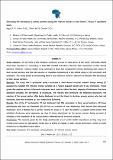| dc.contributor.author | WP Ngigi, OW Odero, MD Othero, OC Obonyo | |
| dc.date.accessioned | 2021-01-11T10:28:14Z | |
| dc.date.available | 2021-01-11T10:28:14Z | |
| dc.date.issued | 2013 | |
| dc.identifier.uri | https://repository.maseno.ac.ke/handle/123456789/3540 | |
| dc.description.abstract | Study objective: As the rates of HIV infection continues to soar in many parts of the world, concerted efforts have been mounted on counseling to help HIV infected individuals disclose their serostatus to their sexual partners. However, various studies have continued to show few seropositive women disclosing their status to their sexual partners and this has become an important impediment to the efforts made in HIV prevention and treatment. The study aimed at establishing factors that influence women’s decision to disclose HIV serostatus to their sexual partners.
Methods: The study was a qualitative study conducted in Kisii district hospital, western Kenya among 87 purposively selected HIV infected women enrolled at a Patient Support Center and 8 key informants. Focus group discussions and key informants interviews were used to collect the data. Aspects of disclosure that were assessed included; the prevalence of disclosure, the reasons that enhanced/ de-enhanced disclosure, the reaction of the sexual partner after being disclosed to and the intent to disclose among women who had not disclosed. Data was analysed by Text2based Beta Softwares
Results: Out of the 87 participants 59 had disclosed their HIV serostatus to their sexual partners. Of those participants who had not disclosed (28) 19 had no intention of ever disclosing. Main factors that enhanced disclosure were a feeling that a partner needed to know or to gain the partner’s support while factors that exhibited disclosure were expressed as; fear of being abandoned by the sexual partner, being accused of infidelity or the possibility of the sexual partner withdrawing his economic support.
Conclusion: The reasons given by the study participants are of public health importance as they may have limited most women to appropriate health care or ability to engage in safer sexual behaviours, which are both tantamount to HIV/AIDS control effort. | en_US |
| dc.publisher | The African Journal of Health Sciences, | en_US |
| dc.subject | Disclosure, HIV serostatus, sexual partners, HIV infected women, Kenya | en_US |
| dc.title | Disclosing HIV Serostatus to sexual partners among HIV infected women in KisiI DistricT, Kenya: A qualitative study | en_US |
| dc.type | Article | en_US |

